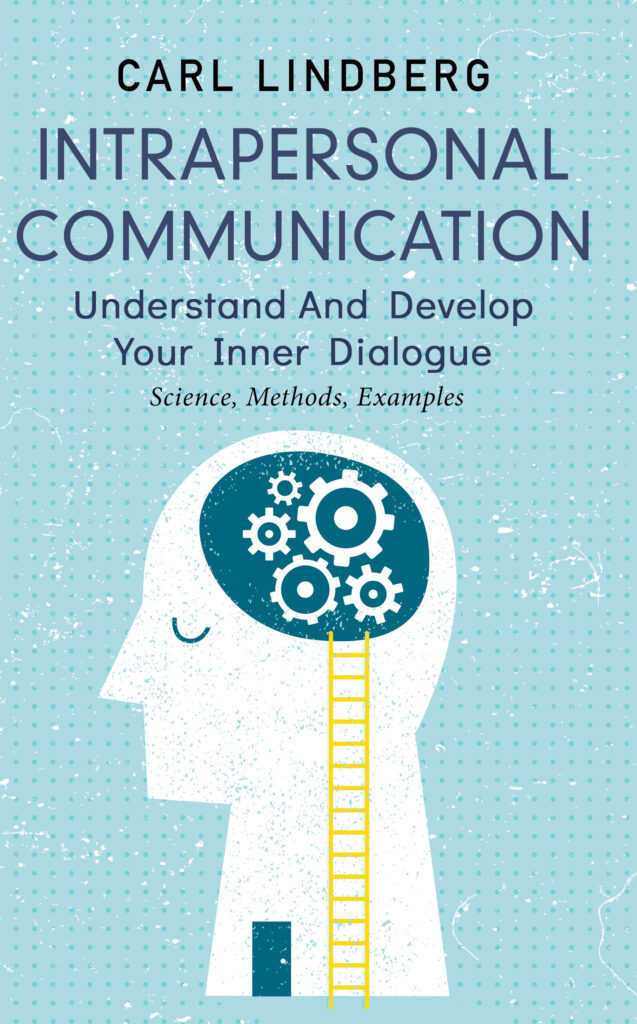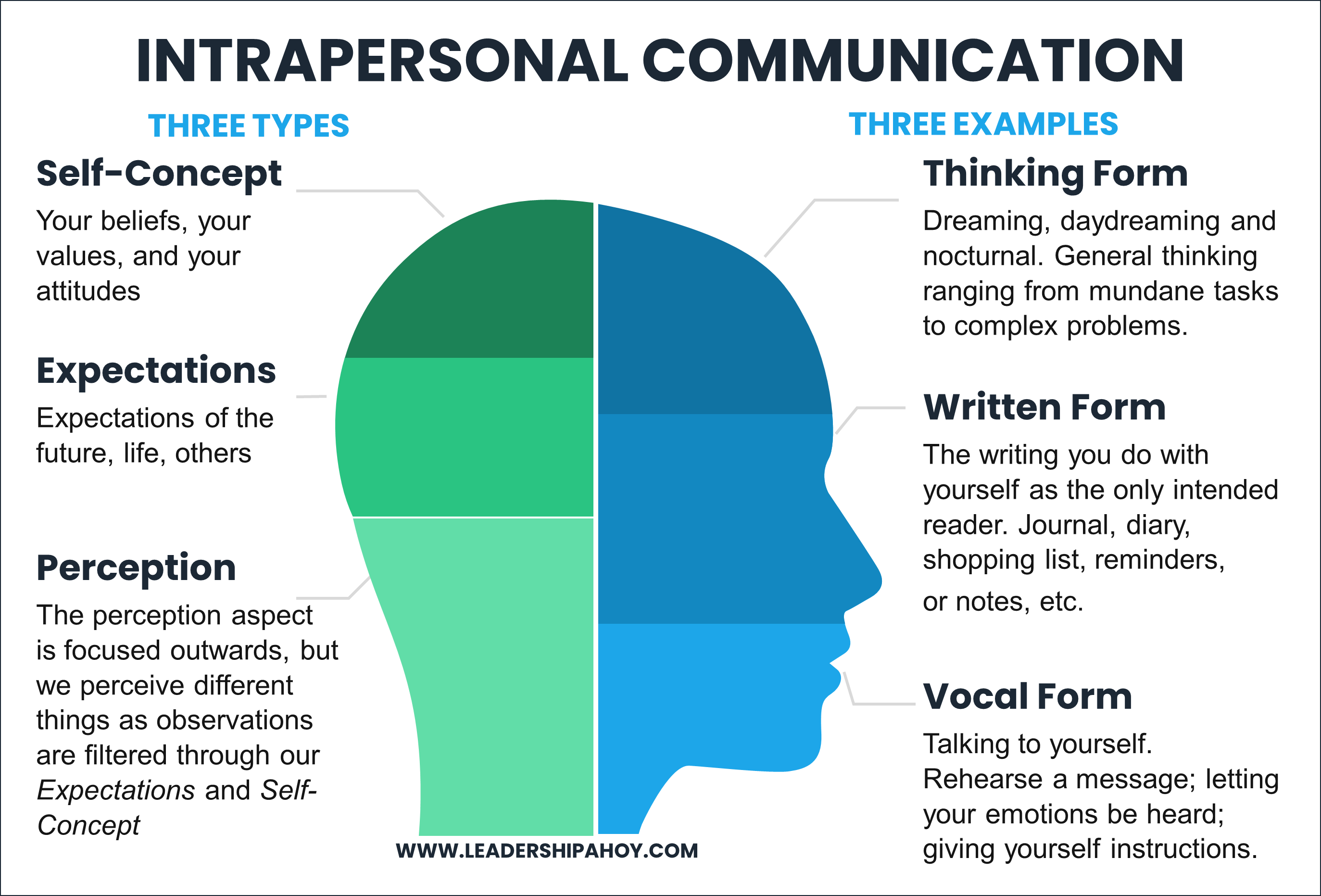
As a business leader, I am curious about communication in general. Knowledge in intrapersonal communication enables me to become a better leader, just like using different leadership styles does. I have also become a better leader both when it comes to my own and the intrapersonal communication of others. Please also check out my book at Amazon: Intrapersonal Communication, which is great for self-development as well as a student reference.
Intrapersonal communication is the communication you have with yourself, either spoken, written, or thought. Intrapersonal communication can be anything from solving a complex problem in your mind to thinking about what to wear today or what to have for breakfast.
In most cases, we refer to the concept of communication as an information exchange between two or more people. Here is where intrapersonal communication differs since it defines the communication that you have with and within yourself. This can be talking to yourself, reading aloud, writing, thinking, meditating, singing, and analyzing for instance. This "internal" dialogue can play an important role in developing your Emotional Intelligence, which is useful for building resonant leadership.
Coach Yourself and Direct Your Inner Dialogue

If you want to read about external communication, check out our article 17 tips on improved communication.
If you read an article or watch a video online – what do you think about it? External stimuli often set you off thinking and before you know it you are engaging in a deep thinking discussion with yourself, i.e. intrapersonal communication.
Besides the normal intrapersonal communication that occurs all the time, there are also techniques and methods of positive affirmations to lead a better, healthy, and successful life using intrapersonal communication.
All intrapersonal communication is triggered by external or internal stimuli. All the rethinking and musings with oneself, and having conversations with yourself in imaginary scenarios are part of intrapersonal communication!
There are three different types of intrapersonal communication, namely self-concept, perception, and expectation.
This is the core foundation of intrapersonal communication since it decides on how you see yourself in relation to other people. This aspect of intrapersonal communication consists of your beliefs, your values, and your attitudes. Again, this is important for developing emotional intelligence, a crucial aspect of being a leader as explained in the Daniel Goleman Leadership Styles framework.
Your attitudes on different topics are normally connected to your core values. These attitudes are based on your values, which are your rules of what are the right and wrong things to do, your ideals, etc. Values are in turn based on your core beliefs, which are your personal perspectives on what is right and wrong, good or bad, etc.
The perception aspect is focused outwards. How you perceive other people and the world, in general, is filtered by your self-concept. Depending on your beliefs, values, and attitudes, you can perceive the same thing differently than another person with differing beliefs, values, and attitudes. This happens all the time, doesn´t it? We perceive things in connection to a framework of judging parameters so to speak. One also tends to perceive yourself in a perhaps better light than others do. After all, you are setting the rules for your own behavior, so it is a very biased thing to judge yourself.
The third type or aspect of intrapersonal communication is regarding expectations of the future. What do you expect of your own future and the future of others? Some people expect to have kids in the future, some don’t. Certain people expect to become something great, others don’t. Your long-term expectations are sometimes projections of what you have learned from environments such as your own family growing up and the society you belong to.
These three aspects are used in your intrapersonal communication as you reflect, think, analyze or clarify. If you ponder on something, you consciously or unconsciously judge it in the context of your self-concept, your perception of the world, and the expectations you have. Makes sense, doesn’t it? These three aspects form a framework to bounce your thoughts on as well as your own rules for how to process things.
Learn more about the components and how to understand your own thinking by reading my book at Amazon: Intrapersonal Communication: Understand And Develop Your Inner Dialogue.

Intrapersonal Communication: types and examples. (Feel free to use the image as long as you link back to this page.)
As mentioned above, there are many ways of performing intrapersonal communication. We will outline some examples in a bit more detail in this chapter.
This includes thinking as well as dreaming, both daydreaming and the dreaming we do when we are asleep, i.e. nocturnal dreaming. When you think about something, whether it is what to have for dinner or a complex mathematical problem, you are engaging in intrapersonal communication.
We think almost all the time, and especially when we are concentrating. Performing different tasks, even when mundane, involves some thinking on what to do next, what to grab, what to move etc. Even if you do not need to think about your activity, then you normally think about something else, right? What happened at work today for instance or what you plan on getting your spouse for the upcoming birthday etc.
This way of performing intrapersonal communication is essentially talking to yourself out loud. Normally reoccurring reasons for this are to repeat or otherwise rehearse a message; letting your emotions be heard; giving yourself instructions.
Most of us do this every now and then, whether it is talking to ourselves in the mirror or perhaps commenting on other drivers while alone in our cars.
This involves all writing you do with yourself as the only intended reader. This could for instance be a personal journal or diary, but could just as well be a shopping list, reminders, or notes.
I take a lot of notes, and I do not necessarily read most of them again, but I would assume that still qualifies as intrapersonal communication regardless.
I describe the different examples in much greater detail in my book, which you can find here: Intrapersonal Communication: Understand And Develop Your Inner Dialogue.
Coach Yourself and Direct Your Inner Dialogue

If you are skilled at intrapersonal communication, there are some good pros for you. Four advantages are listed below.
1. Understanding yourself and your emotions
By realizing and being aware of your own emotional state you can consider what impact it has on your current and any future intrapersonal communication you engage in. If you are in a positive or negative state, it will color your internal communication. Negative emotions can lead to negative thoughts and interpretation of events and the acts of others and vice versa for positive emotions. Knowing how your emotional state affects your thinking and intrapersonal communication enables you to second guess your conclusions and mitigate the emotional influence on your thinking. Realizing your emotions makes it possible for you to pause and reflect on what is going on and the reasons for it. If you are good at this, you can catch yourself in the act and correct yourself when your thoughts are heading in the wrong direction.
2. Empathy and understanding others
Grasping and understanding the situation another human being is in and considering what it would be like is to a large degree a case of intrapersonal communication. Yes, you might ask questions to the other person, but putting yourself in his or her shoes is an internal activity within your own mind. Deciding what to ask as the next question depending on the previous answer is also an act of intrapersonal communication. Hence, being skilled at this type of communication will likely make you better at understanding and treating others in a good way.
This is very important for affiliative leaders, transformational leaders, and servant leaders. (Read about all those leadership approaches here: leadership styles.)
3. Good analytical skills
By visualizing and seeing problems in different directions in your intrapersonal communication, you can more easily understand what additional information is required and how and why it is important in the context. You can identify options and alternatives on how to move forward and judge the outcome and likelihood of those different aspects. I.e. you are good at thinking.
4. Improved decision-making skills
If you have the capacity to think things through and weigh aspects and consequences back and forth which is basically part of the aforementioned analytical skills, it will be easier for you to make good decisions. You are more likely to understand the consequences of different decisions as well as if not taking a decision at all.
All the above-mentioned skills within the intrapersonal communications department are likely to help you in relationships and other types of communication. Makes sense, right? I teach you a lot more about how to use your thinking to your advantage and in my book at Amazon: Intrapersonal Communication: Understand And Develop Your Inner Dialogue.